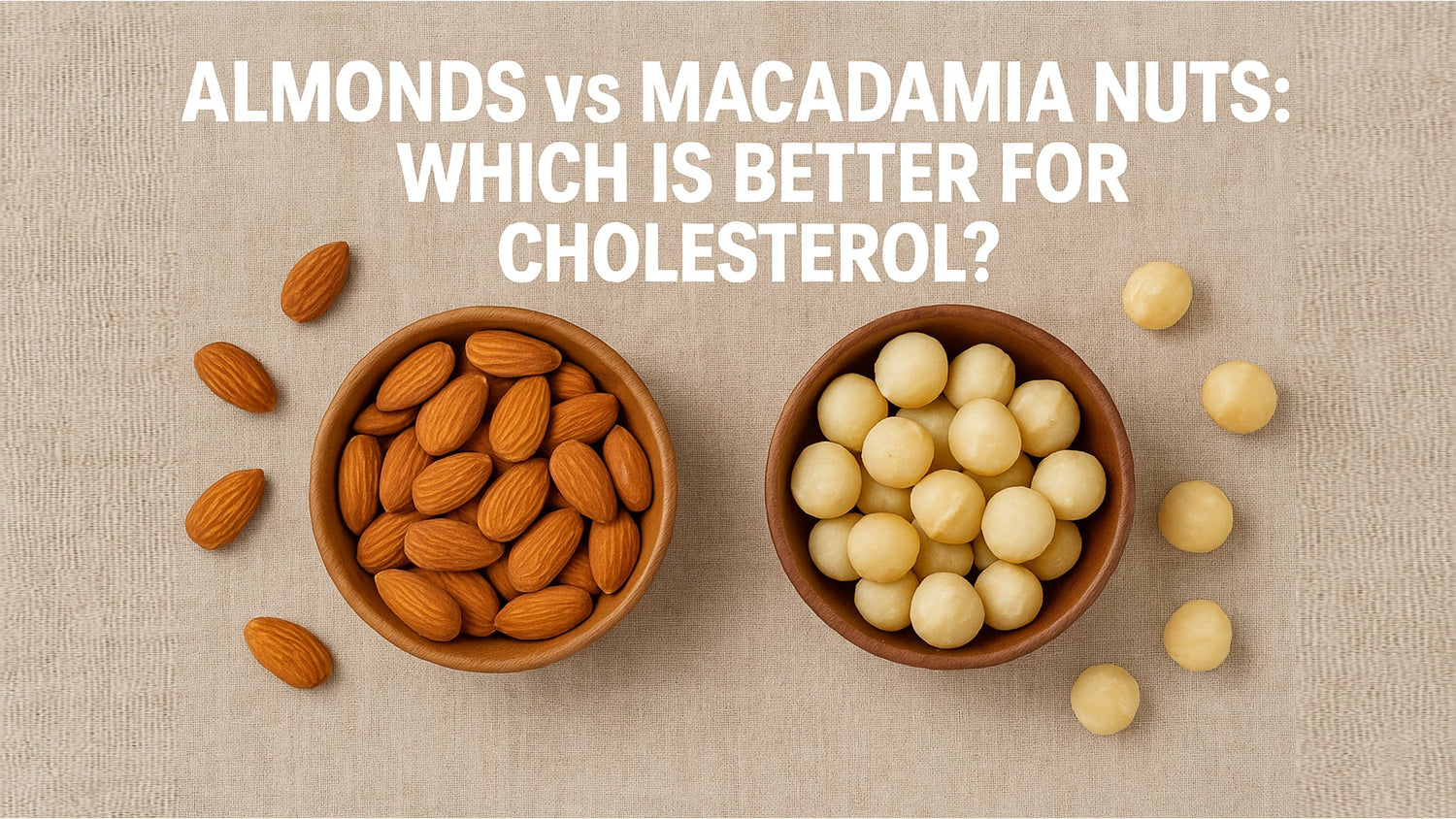
Nuts are known for their heart-healthy benefits, and both almonds and macadamia nuts are often highlighted for their role in managing cholesterol. These nuts are rich in healthy fats, fiber, and essential nutrients that can support cardiovascular health. Macadamia nuts are specifically rich in monounsaturated fats. However, the specific benefits of almonds and macadamia nuts in lowering cholesterol levels vary due to differences in their nutritional content. This section explores how each nut stacks up in terms of macronutrients and their impact on cholesterol management.
Table of Contents
-
Introduction
Shop Related Products
-
Nutritional Comparison: Almonds vs Macadamia Nut
-
The Impact of Almonds on Cholesterol
-
The Role of Macadamia Nuts in Cholesterol Management
-
Which Nut Is Better for Cholesterol: Almonds or Macadamia Nuts?
-
Conclusion
-
FAQs
Nutritional Comparison: Almonds vs Macadamia Nuts
Macronutrient Profile
-
Almonds (per 1-ounce serving, about 23 almonds):
-
Calories: 160
-
Protein: 6 grams
-
Total Fat: 14 grams
-
Saturated Fat: 1 gram
-
Monounsaturated Fat: 9 grams
-
Carbohydrates: 6 grams
-
Fiber: 3.5 grams
-
Sugar: 1 gram
-
Macadamia Nuts (per 1-ounce serving, about 10-12 nuts):
-
Calories: 200
-
Protein: 2 grams
-
Total Fat: 22 grams
-
Saturated Fat: 3.5 grams
-
Monounsaturated Fat: 17 grams
-
Carbohydrates: 4 grams
-
Fiber: 2.4 grams
-
Sugar: 1 gram
Almonds provide a more balanced profile of protein and fiber with fewer calories, while macadamia nuts are higher in fat content, especially monounsaturated fats, which are beneficial for heart health.
Fiber and Healthy Fats
Almonds are an excellent source of fiber, which plays a role in reducing cholesterol absorption and improving digestion. The monounsaturated fats in almonds also help maintain healthy cholesterol levels.
Macadamia nuts are particularly rich in monounsaturated fats, which are linked to reduced LDL (bad) cholesterol. While they have less fiber than almonds, the high fat content can help improve overall heart health when consumed in moderation.
Both nuts contribute to heart health, but their specific strengths vary due to differences in fiber and fat composition.
The Impact of Almonds on Cholesterol
Almonds have long been considered a heart-healthy food, particularly for their ability to improve cholesterol levels. They are rich in monounsaturated fats, which have been shown to reduce LDL (bad) cholesterol while increasing HDL (good) cholesterol. The high fiber content in almonds also plays a significant role in cholesterol management, as fiber helps in binding cholesterol in the digestive system and removing it from the body. Additionally, almonds contain plant sterols, compounds that have been found to block the absorption of cholesterol in the intestines.
Several studies have highlighted the effectiveness of almonds in lowering total cholesterol levels. For instance, research has shown that consuming about a handful of almonds daily can reduce LDL cholesterol levels by up to 10%. This makes almonds an excellent snack choice for those looking to manage their cholesterol levels and promote heart health.
The Role of Macadamia Nuts in Cholesterol Management
Macadamia nuts are another type of nut that has been found to offer significant benefits for cholesterol management. While macadamia nuts are high in fat, they primarily contain monounsaturated fats, which are considered heart-healthy. These healthy fats can help reduce LDL cholesterol levels while maintaining or even increasing HDL cholesterol, the "good" cholesterol that helps protect against heart disease.
Studies suggest that incorporating macadamia nuts into the diet can have a positive effect on blood lipid profiles. For example, a study found that participants who consumed macadamia nuts regularly had a noticeable improvement in their cholesterol levels, with reductions in total cholesterol and LDL cholesterol. Furthermore, macadamia nuts are a rich source of antioxidants, which can help reduce oxidative stress in the body and protect against inflammation—two factors that contribute to heart disease.
Although macadamia nuts are more calorie-dense compared to some other nuts, they can still be a beneficial part of a heart-healthy diet when consumed in moderation. Their high fat content, particularly monounsaturated fats, makes them an excellent choice for improving cholesterol levels without compromising heart health.
Which Nut Is Better for Cholesterol: Almonds or Macadamia Nuts?
When it comes to cholesterol management, both almonds and macadamia nuts offer unique benefits, but almonds are generally considered more effective at lowering cholesterol levels. Almonds are rich in monounsaturated fats, fiber, and plant sterols, all of which have been shown to help reduce LDL (bad) cholesterol while increasing HDL (good) cholesterol. The high fiber content in almonds further aids in cholesterol control by binding to bile acids, which are then excreted, reducing the amount of cholesterol in the bloodstream.
On the other hand, macadamia nuts, while also rich in healthy fats, particularly monounsaturated fats, have a higher omega-6 to omega-3 ratio. This can be beneficial for heart health, but it may not be as effective in lowering cholesterol levels as almonds. Macadamia nuts are still a great option for overall heart health due to their nutrient profile, but if your primary goal is to manage cholesterol, almonds may be the better choice.
In conclusion, while both nuts offer heart-healthy benefits, almonds have more substantial evidence supporting their role in reducing cholesterol levels, making them a top choice for cholesterol management. However, incorporating both nuts into a balanced diet can still provide valuable health benefits.
Conclusion
Both almonds and macadamia nuts are excellent choices for promoting heart health, but when it comes to lowering cholesterol levels, almonds are the better option due to their higher fiber and plant sterol content. However, incorporating both into your diet can provide a variety of nutrients and support overall cardiovascular health. For premium quality almonds and macadamia nuts, Krishival offers a selection of top-tier dry fruits, ensuring you get the best for your heart health.
FAQs
1. How do almonds help lower cholesterol?
Almonds are rich in monounsaturated fats, fiber, and plant sterols. These compounds work together to reduce LDL cholesterol levels, thus lowering the risk of heart disease.
2. Can macadamia nuts help reduce LDL cholesterol?
Macadamia nuts are high in monounsaturated fats, which are heart-healthy fats that can help improve cholesterol levels. However, their effect on LDL cholesterol is not as pronounced as that of almonds.
3. Are almonds better than macadamia nuts for heart health?
Yes, almonds are more effective for heart health, particularly in lowering LDL cholesterol levels, due to their higher fiber and plant sterol content compared to macadamia nuts.
4. How many almonds should I eat daily to lower cholesterol?
Eating about 1 ounce (28 grams) or a small handful of almonds daily can be effective in lowering cholesterol and improving heart health, as part of a balanced diet.
5. Are macadamia nuts high in fat? Does this affect cholesterol?
Yes, macadamia nuts are high in fat, but they primarily contain monounsaturated fats, which are considered heart-healthy and can help improve cholesterol levels when consumed in moderation.
6. Can almonds or macadamia nuts help with high triglycerides?
Almonds are more effective in lowering triglycerides due to their higher fiber and antioxidant content, but both nuts can help support overall cardiovascular health when consumed as part of a healthy diet.
7. What is the best time to eat almonds for cholesterol benefits?
The best time to eat almonds is typically as part of a balanced meal, as this helps with digestion and allows the body to absorb the healthy fats and nutrients more efficiently.
8. How do fiber and healthy fats in nuts affect cholesterol levels?
Fiber helps lower LDL cholesterol by binding to it and removing it from the body, while healthy fats, particularly monounsaturated fats, can help raise HDL (good) cholesterol levels and improve heart health.
9. Are there any side effects of eating too many almonds or macadamia nuts?
Eating too many almonds or macadamia nuts may lead to excess calorie intake, which can contribute to weight gain. Moderation is key to enjoying the health benefits without the risk of overeating.
10. Can macadamia nuts be included in a low-carb or keto diet for cholesterol management?
Yes, macadamia nuts are a great addition to low-carb or keto diets due to their high fat content and low carbohydrate levels, making them a heart-healthy snack that can support cholesterol management.











